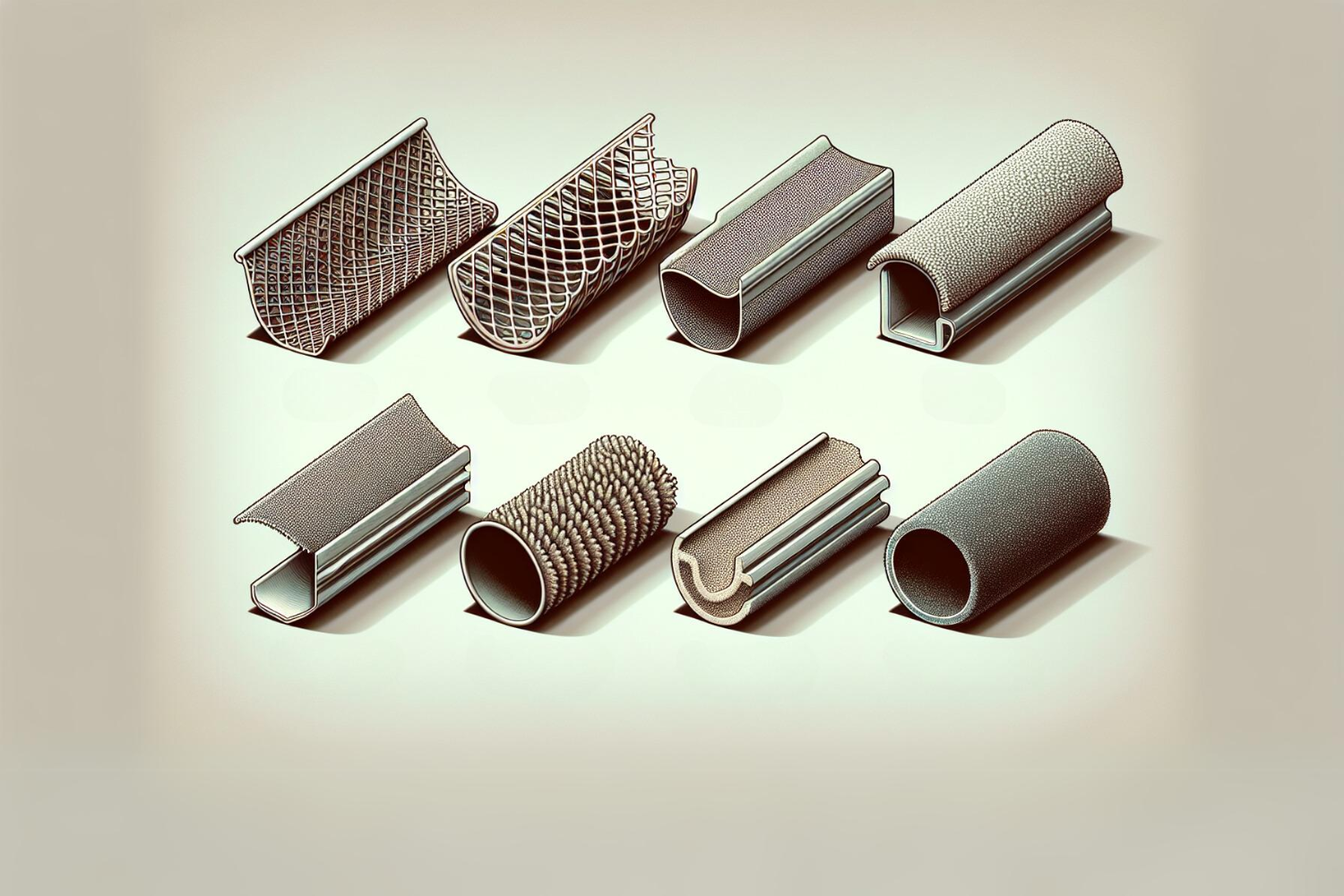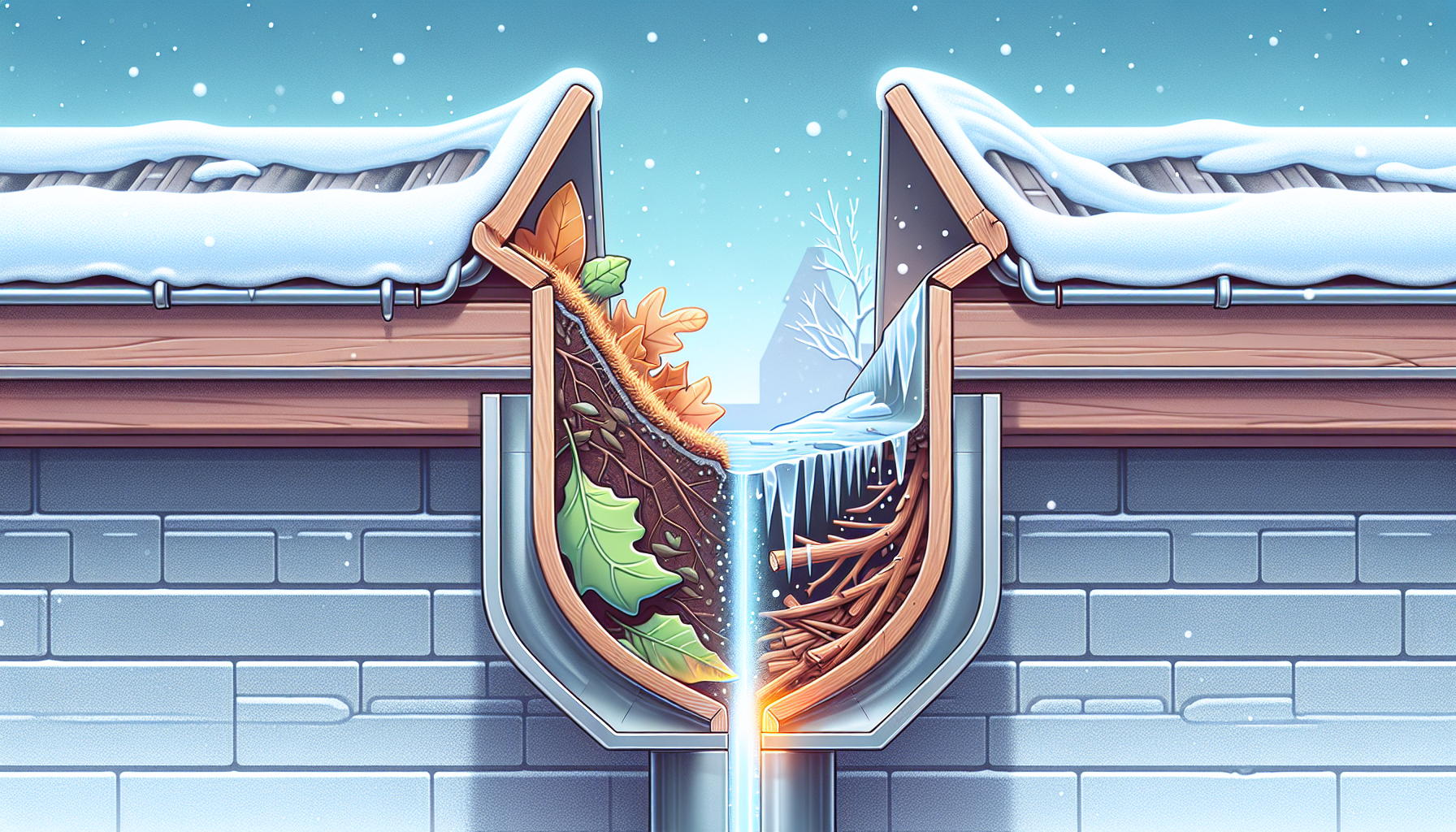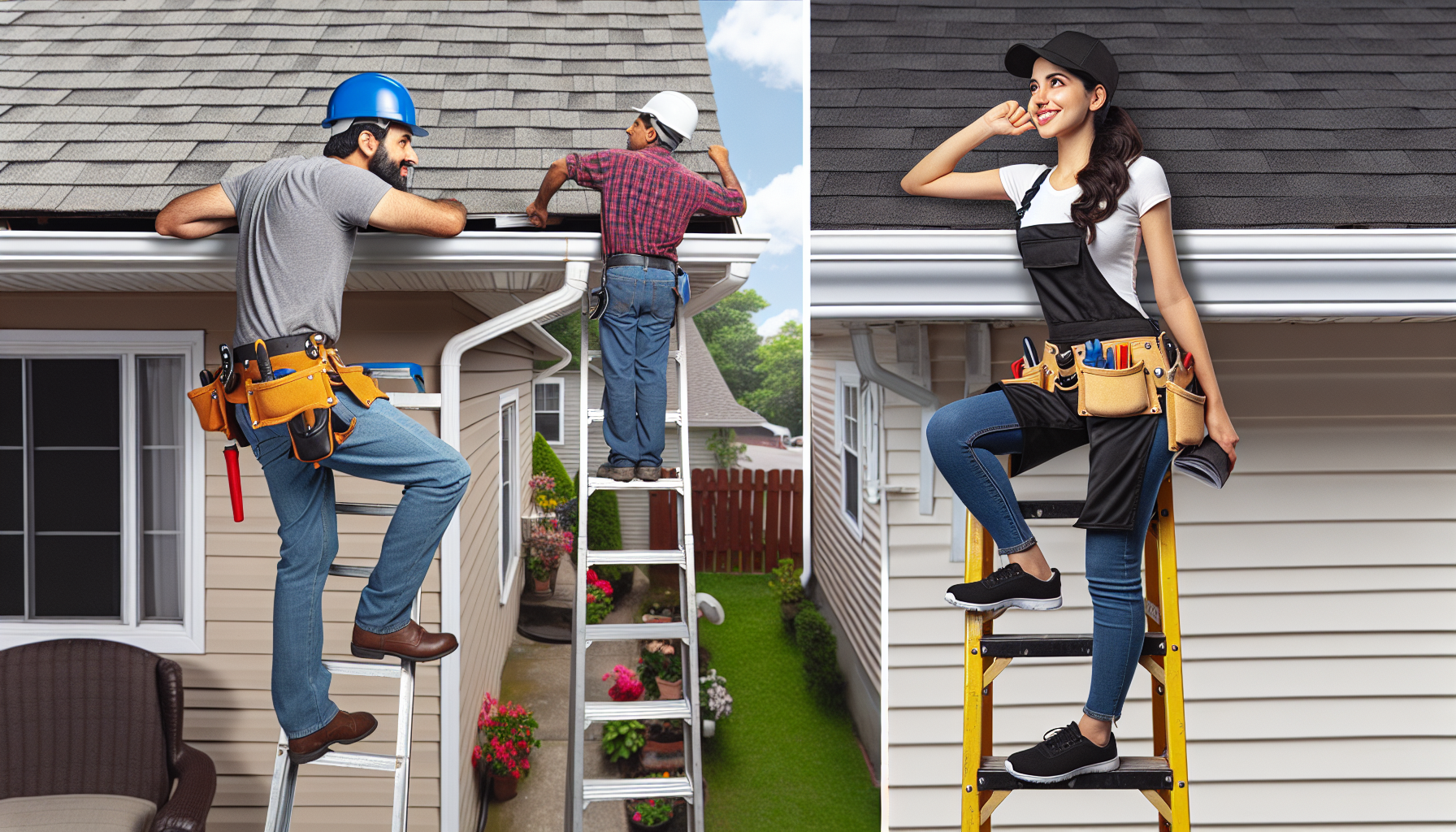What Are the Pros and Cons of Gutter Covers and Gutter Guard Systems?
Rain gutters, including seamless gutter systems, are the unsung heroes of your home, tirelessly working to channel water away from your foundation. But they face an age-old nemesis: debris. Leaves, twigs, and other detritus can clog your gutters, causing water to overflow and creating a breeding ground for pests. The solution? Gutter guards. These handy devices keep your gutters clear, allowing water to flow freely while preventing debris from causing blockages. However, it’s important to consider the pros and cons of gutter guards before making a decision on whether to install them.
Key Takeaways
- “My leaf guard gutters are clogged” can be a complaint of the past, Gutter guards are an effective solution to prevent blocked gutters and water damage.
- They reduce the need for frequent cleaning, while also preventing vermin and insect infestations.
- Professional installation of gutter guardian systems provides assurance of correct installation, but regular maintenance is essential for their effectiveness and longevity.
Understanding Gutter Guards and Their Functionality

Gutter guards including rain gutter screens, gutter covering systems, and gutter screens are a straightforward yet inventive resolution for gutter blockages. They work by creating a barrier that prevents debris from entering the gutters, while allowing water to flow through. The performance of gutter guard systems relies on the guard’s type and quality, along with the particular conditions they encounter, which is why it’s essential to understand how gutter guards work.
In regions with substantial rainfall, where gutters can swiftly get inundated by water, they prove particularly beneficial. Gutter guards also safeguard homes from possible water damage by keeping gutters free from debris.
The Role of Gutter Guards in Debris Management
The primary function of quality gutter guards is to filter out debris from rain gutters, reducing the need for frequent gutter cleaning and maintenance, and addressing the question, “are gutter guards necessary?”. By keeping gutters clear, gutter guards also help prevent vermin and insects from breeding in stagnant water, reducing the likelihood of infestations.
Gutter guards including closed gutter systems, often referred to as rain gutter coverings, are available in various designs, each intended to exclude a particular type of debris. Some common types of gutter guards include:
- Leaf guards: designed to filter out large debris like leaves and twigs
- Gutter screens, including mesh and micro-mesh guards, feature tiny holes that allow water to pass through while keeping out even the smallest debris
- Brush gutter guards: designed to block debris while allowing water to flow through
- Foam guards: designed to block debris while allowing water to flow through
The selection of the gutter guard should reflect the common debris type in your locality.
Types of Gutter Guard Materials and Designs
Gutter guards are available in an extensive range of materials and designs, each having its advantages and disadvantages. Mesh and micro-mesh gutter guards, for instance, feature tiny holes that allow water to pass through while keeping out even the smallest debris. However, they may require professional installation and occasional cleaning.
Another favored choice is screen gutter guards. These perforated pieces of metal or plastic are placed under the initial row of shingles and above the gutters. Although you can install them as a DIY project, they necessitate yearly cleaning to retain their effectiveness.
Other types of gutter guards, such as reverse curve, brush, and foam, have different designs and maintenance requirements. Your specific needs, budget, and aesthetic preferences dictate the choice of gutter guard material and design.
Advantages of Installing Gutter Guards

Gutter guards, especially when professionally installed gutter guards, provide numerous benefits, making them a valuable investment for homeowners. They:
- Reduce the frequency of cleaning
- Lower the risk of gutter overflow
- Save homeowners both time and money
- Prevent gutters from becoming clogged
- Protect homes from potential water damage, including soil erosion, foundation cracks, basement flooding, and damage to landscaping.
Moreover, gutter guards can substantially extend your gutters’ lifespan by preventing debris accumulation and standing water.
Minimizing Maintenance with Gutter Guards
One of the strongest arguments for installing gutter guards is the reduction they provide in gutter maintenance and gutter cleanings. Without gutter guards protection, gutters typically need to be cleaned twice a year to remove accumulated debris. But with gutter guards, this frequency can be reduced to once a year or even less, resulting in significant time and cost savings.
By reducing the need for frequent cleaning, gutter guards also lower the accident risk. Cleaning gutters, which involves climbing ladders and working at heights, can pose a danger. With gutter guards, you can avoid these risks and enjoy peace of mind knowing that your gutters are functioning optimally with minimal maintenance.
Preventing Water-Related Damages
Leaf filter gutter protection systems serve a significant role in preventing water-related damages by keeping gutters free of leaves and debris.. They:
- Ensure proper water flow through the gutter system
- Reduce the risk of leaks, stains, and foundation issues
- Prevent water overflow, which can erode the soil around the foundation, cause basement flooding, and lead to structural damage
By keeping existing gutters free of debris and allowing water to flow smoothly, gutter guards effectively prevent these issues.
Lack of regular maintenance for gutter guards can also result in sagging gutters, water overflow, and ultimately foundation damage due to improper water diversion. Maintaining the effectiveness of gutter guards and preventing potential water damage requires regular maintenance, including cleaning and inspection.
Extending Gutter Lifespan and Preventing Ice Dams

By preventing the accumulation of debris in the gutters, gutter guards can significantly extend the lifespan of your gutter system. Debris can cause gutters to corrode, crack, and sag, leading to premature wear and tear. Gutter guards keep gutters free of debris and standing water, reducing the risk of these issues and ensuring your gutters last longer.
Gutter guards, including heated winter gutter guards, can help prevent ice dams in colder climates, functioning as effective rain gutter protectors. Ice dams form when water becomes trapped in the gutters and freezes, blocking the flow of water and causing it to seep under the shingles and into the house. By keeping gutters clear and ensuring water can flow freely, gutter guards reduce the risk of ice dams, protecting your home from potential water damage and extending the lifespan of your roof.
The Drawbacks of Gutter Guards
Despite their numerous benefits, gutter guards have their drawbacks. One of the main challenges is that they can still allow small debris, such as pine needles and seeds, to enter the gutters. This can lead to clogs and hinder the proper flow of water.
Moreover, considering the cons of gutter guards, they can affect a home’s aesthetics, not blending well with the house design, and necessitate extra maintenance or cleaning.
Potential for Pine Needles and Small Debris Accumulation
While gutter guards do an excellent job of keeping out large debris like leaves and twigs, they can struggle with smaller debris. Pine needles, seed pods, and fine particles can still find their way into the gutters, potentially leading to blockages.
However, various solutions to this problem are available. Micro-mesh gutter guards, for instance, feature minuscule holes that can filter out even small debris. However, these types of gutter guards may require occasional cleaning to maintain their effectiveness.
Regularly cleaning your gutter guards, at least once every three months if they are susceptible to small debris accumulation, can help maintain proper water flow and avoid clogs.
Aesthetic Impact and Installation Considerations
Another potential drawback of gutter guards is their impact on the aesthetics of your home. Some gutter guards may not blend well with the design of your house, or they may accumulate visible debris on top. In addition, improper installation can create gaps or unevenness along the roofline.
While aesthetics are subjective, it’s worth considering the appearance of gutter guards on your house before deciding. Furthermore, it’s important to ensure that the installation of gutter guards won’t compromise your roof warranty. Some gutter guards need to be fitted under the first row of shingles, which can potentially damage the roof and void the warranty.
Cost Analysis: Gutter Guards vs. Regular Gutter Cleaning

While gutter guards do come with an upfront cost, they can yield savings in the long run by curbing the need for regular gutter cleaning. The cost of gutter guard installation, such as leaf guard gutters cost, can range from $900 to $2000 depending on the type of gutter guard and whether you choose to install them yourself or hire a professional. However, the ongoing savings from reduced cleaning costs can offset the initial investment over time.
Initial Investment vs. Ongoing Savings
The initial investment for gutter guard installation can be substantial, particularly if you opt for professional installation. High-quality DIY gutter guards may cost approximately $4-$5 per linear foot for materials, while professional installation of more complex systems can range from $10 to $25 per linear foot.
However, the continuous savings can make gutter guards an economical choice in the long term. Without gutter guards, you can expect to pay between $100 and $360 per year on regular gutter cleaning. With gutter guards, these costs can be significantly reduced, even taking into account the occasional maintenance required for the guards.
Selecting the Right Gutter Guard for Your Home
Choosing the right gutter guard for your home might seem overwhelming, but it doesn’t have to be. By assessing your home’s requirements and seeking professional guidance, you can find a gutter guard system that suits your needs and budget.
Assessing Your Home’s Requirements
When choosing a gutter guard for your home, it’s important to consider the type of debris in your area, the average rainfall, and your budget. For instance, if you live in an area with heavy rainfall, you’ll need a gutter guard that can handle large volumes of water.
Your budget also holds a significant role in your choice of gutter guard. While some types of gutter guards, like micro-mesh, offer superior protection, they also come with a higher price tag. On the other hand, more affordable options like screen or foam gutter guards may be sufficient, especially if you’re willing to do a bit more maintenance.
Professional Guidance from CoMo Premium Exteriors
Navigating the wide range of gutter guards on the market can be challenging, and that’s where professional guidance comes in. The experts at CoMo Premium Exteriors can provide valuable advice and recommendations based on their years of experience in the field.
During a consultation, the professionals at CoMo Premium Exteriors will conduct a comprehensive inspection of your property to assess the existing gutter condition and recommend the best gutter guard system for your needs. This ensures that you get a system that fits perfectly, functions optimally, and provides the best protection for your home.
Installation Insights: DIY Versus Professional Services

Your comfort level with DIY projects and your budget determine whether you choose to install your gutter guards yourself or hire a professional. While DIY installation can save you money, professional installation ensures that the job is done right and reduces the risk of damage to your property.
The Risks and Rewards of DIY Gutter Guard Installation
If you’re handy and comfortable working at heights, DIY gutter guard installation can be an economical option. It can also provide a sense of satisfaction and accomplishment. However, DIY installation carries risks, including the potential for leaks, sagging gutters, and structural damage due to incorrect installation.
On the other hand, professional gutter guard installation may come with a higher cost, but it also offers peace of mind. Professionals have the expertise and experience to install gutter guards correctly, ensuring they function optimally and last longer. They can also handle any challenges that arise during installation, reducing the risk of damage to your property.
Gutter Guard Maintenance Tips
Even with gutter guards installed, consistent maintenance remains vital to ensure their effectiveness and extend their lifespan. Recommended maintenance practices include cleaning the gutters at least once every two years, or more frequently if there is heavy tree coverage near your home.
In addition to cleaning, you should also inspect your gutter guards regularly for damage. This includes looking for leaks, checking for debris that may have gotten through the guards, and ensuring that the guards are securely attached. With regular maintenance, your gutter guards can continue to protect your home for many years to come.
Summary
Gutter guards, like gutter helmet vs leaf guard systems, are a practical solution to a common problem faced by homeowners: debris-filled gutters. By preventing debris from entering the gutters, gutter guards reduce the need for regular cleaning, save time and money, and protect your home from potential water damage. They come in various materials and designs, each with its pros and cons, and can be installed DIY or professionally, depending on your comfort level and budget.
While gutter guards do have some drawbacks, such as the potential for small debris accumulation and aesthetic impact, their benefits far outweigh their disadvantages. With the right gutter guard, regular maintenance, and professional guidance if needed, you can enjoy a debris-free and well-functioning gutter system that protects your home and gives you peace of mind.
Frequently Asked Questions
Is there a downside to gutter guards?
Gutter guards can provide a useful solution for many homeowners, however they still require periodic maintenance and cleaning, may not stop all debris from entering gutters, and can be costly.
Can gutters get clogged with gutter guards?
Gutters with gutter guards can get clogged due to leaves and debris caught in the brush, so they should be cleaned more frequently for optimal performance.
Do gutter guards work in heavy rain?
Micromesh, aluminum, and reverse-curve gutter guards all effectively keep debris out of the gutters and can handle heavy rain without overflowing. Therefore, yes, gutter guards do work in heavy rain.
Should you remove gutter guards in the winter?
Removing your gutter guards in the winter may be a wise decision if they are metal-based, as they are prone to freezing when temperatures drop and can cause damage due to ice dams and snow buildup.
Are gutter guards worth the investment?
Gutter guards can save you time and money by preventing clogs and reducing the need for regular cleaning, while also protecting your home from water damage. They are definitely worth the investment.
What’s the best gutter guard for preventing clogs and water damage?
Identifying what’s the best gutter guard depends on your home’s specific needs, including the type of debris common in your area and the level of rainfall. Mesh and micro-mesh gutter guards are highly effective for a wide range of debris sizes.
Are covered gutters better than open gutters?
Comparing covered gutters vs open gutters reveals that covered gutters offer superior protection against debris and reduce maintenance needs, making them a worthwhile investment for many homeowners.
How effective are gutterguard systems in preventing debris accumulation?
Gutterguard systems are highly effective in preventing debris accumulation, ensuring that water flows freely through your gutters and protecting your home from potential water damage.
What do reviews say about gutter leaf guards?
Reviews often highlight the efficiency of gutter leaf guards in preventing large and small debris accumulation. However, the effectiveness can vary based on the type of gutter leaf guard and the specific environmental conditions. Regular inspections and maintenance are recommended for optimal performance.
What is the cost per foot of K-Guard gutter systems?
The cost per foot of K-Guard gutter systems can vary based on your specific needs and installation requirements. Generally, K Guard gutter cost per foot is competitive, offering value through durability and less frequent maintenance needs. For an accurate estimate tailored to your home, please contact our experts.
About The Author
Elias Abadi
Owner
Elias, the founder of CoMo Premium Exteriors, has steered the company to become a leading exterior renovation firm in Mid-Missouri, emphasizing quality and customer-centric values. A Columbia resident since age 10, he is an ardent Mizzou athletics supporter. Outside of work, Elias enjoys family time, attending his three sons’ sports activities, and engaging in outdoor pursuits like hiking, fishing, gardening, and hunting.










